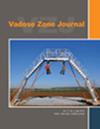探索利用土壤温度识别优先流和侧向流的可行性
IF 2.5
3区 地球科学
Q3 ENVIRONMENTAL SCIENCES
引用次数: 0
摘要
土壤温度会受到快速渗透的水的影响。垂直优先流(VPF)和横向地下流(LSF)事件可能导致土壤热量分布不均匀。目的是确定渗透对具有强迫垂直运动的蒸渗仪和坡地蒸渗仪中土壤温度时间序列的影响,以区分VPF和LSF。小波相干分析(WCA)用于分析在可能出现LSF的地层中,在靠近地表(15 cm深度)和低于地表(80 cm深度)的Colluvic Regosol中测量的土壤温度时间序列。这些深度的土壤温度在日常尺度上相互关联,反映了气温的昼夜波动。月尺度上的相关性与2015年5月至10月降水的小波频谱中的周期性相似。在此期间,80 cm深度的土壤温度在蒸渗仪中的变化速度快于在田间的变化速度,这表明蒸渗仪主要由渗透引起的垂直热运动。当假设通过横向移动温度平衡的土壤水在坡地土壤中产生温度阻尼效应时,在蒸渗仪和田地之间观察到的土壤温度剖面偏差可能指示田地中的LSF。然而,LSF的发生只能通过10月和5月单个降雨事件的土壤含水量测量来验证。该分析有助于确定时间序列中的定性相关事件。为了进行定量分析,需要考虑土壤水分数据。本文章由计算机程序翻译,如有差异,请以英文原文为准。
Exploring the feasibility of using the soil temperature to identify preferential and lateral subsurface flows
Soil temperature can be influenced by rapidly infiltrating water. Deviations from a uniform soil heat distribution could result from vertical preferential flow (VPF) and lateral subsurface flow (LSF) events. The objective was to identify the effect of infiltration on the soil temperature time series in a lysimeter with forced vertical movement and that in a sloping field to distinguish between VPF and LSF. Wavelet coherence analysis (WCA) was used to analyze soil temperature time series measured in a Colluvic Regosol close to the surface (15‐cm depth) and below (80‐cm depth) in a horizon with possible LSF occurrence. The soil temperatures in these depths were correlated at a daily scale reflecting diurnal fluctuations of air temperatures. A correlation at a monthly scale was similar to the periodicity in the wavelet spectrum of the precipitation from May through October 2015. In this period, soil temperatures at 80‐cm depth changed faster in the lysimeter than in the field, indicating a dominating infiltration‐induced vertical heat movement in the lysimeter. When assuming a temperature‐dampening effect in the sloping field soil by laterally moving temperature‐equilibrated soil water, observed deviations in soil temperature profiles between lysimeter and field could be indicative for LSF in the field. However, LSF occurrence could only be verified by soil water content measurements for single rainfall events in October and May. The analysis was useful to identify qualitatively relevant events in a time series. For quantitative analysis, soil moisture data need to be considered.
求助全文
通过发布文献求助,成功后即可免费获取论文全文。
去求助
来源期刊

Vadose Zone Journal
环境科学-环境科学
CiteScore
5.60
自引率
7.10%
发文量
61
审稿时长
3.8 months
期刊介绍:
Vadose Zone Journal is a unique publication outlet for interdisciplinary research and assessment of the vadose zone, the portion of the Critical Zone that comprises the Earth’s critical living surface down to groundwater. It is a peer-reviewed, international journal publishing reviews, original research, and special sections across a wide range of disciplines. Vadose Zone Journal reports fundamental and applied research from disciplinary and multidisciplinary investigations, including assessment and policy analyses, of the mostly unsaturated zone between the soil surface and the groundwater table. The goal is to disseminate information to facilitate science-based decision-making and sustainable management of the vadose zone. Examples of topic areas suitable for VZJ are variably saturated fluid flow, heat and solute transport in granular and fractured media, flow processes in the capillary fringe at or near the water table, water table management, regional and global climate change impacts on the vadose zone, carbon sequestration, design and performance of waste disposal facilities, long-term stewardship of contaminated sites in the vadose zone, biogeochemical transformation processes, microbial processes in shallow and deep formations, bioremediation, and the fate and transport of radionuclides, inorganic and organic chemicals, colloids, viruses, and microorganisms. Articles in VZJ also address yet-to-be-resolved issues, such as how to quantify heterogeneity of subsurface processes and properties, and how to couple physical, chemical, and biological processes across a range of spatial scales from the molecular to the global.
 求助内容:
求助内容: 应助结果提醒方式:
应助结果提醒方式:


